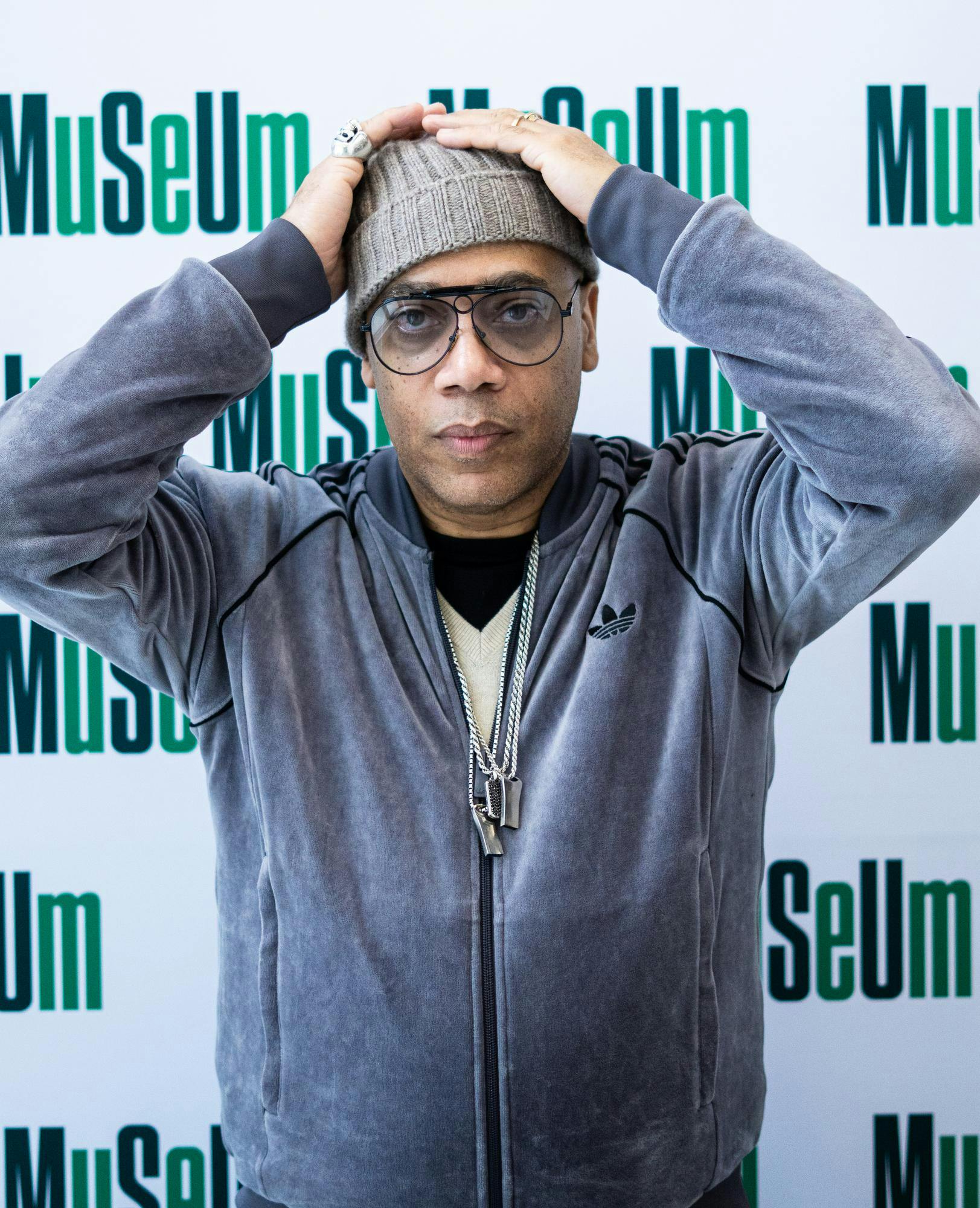In Wells Hall room B106 last week, the country’s next generation of young conservatives were buzzing with excitement.
Charlie Kirk, the charismatic founder of Turning Point USA, was announced to be coming to campus in April, and its Michigan State University chapter was eager to meet him.
“Who’s excited for the biggest political event on Michigan State’s campus?” said MSU Turning Point USA president and computer science senior Alex Bitzan. The group cheered.
Kirk, referred to by some MSU Turning Point members by the more familial “Chuck,” is a 31-year-old conservative media personality whose visit to MSU is one stop on his “The American Comeback Tour,” a part-celebration of November’s Republican electoral victories, part-questionnaire opportunity for his young fans and detractors.
He hails from a genre of conservative outreach that finds most of its success not in real-time conversations, which, especially in Kirk’s case, often lean more incendiary than genuine, but in the viral clips that they produce. It's a market where the currency is moments made for the camera; bursts of righteous outrage, rhetorical dunks, and “trolling” of haughty liberals proliferate his social media pages.
Kirk’s smug, defiant performance is the sort that’s often admired by Turning Point, whose earnest desire to engage in political discussion is often paired — and sometimes rivaled — by an inability to resist a good joke.
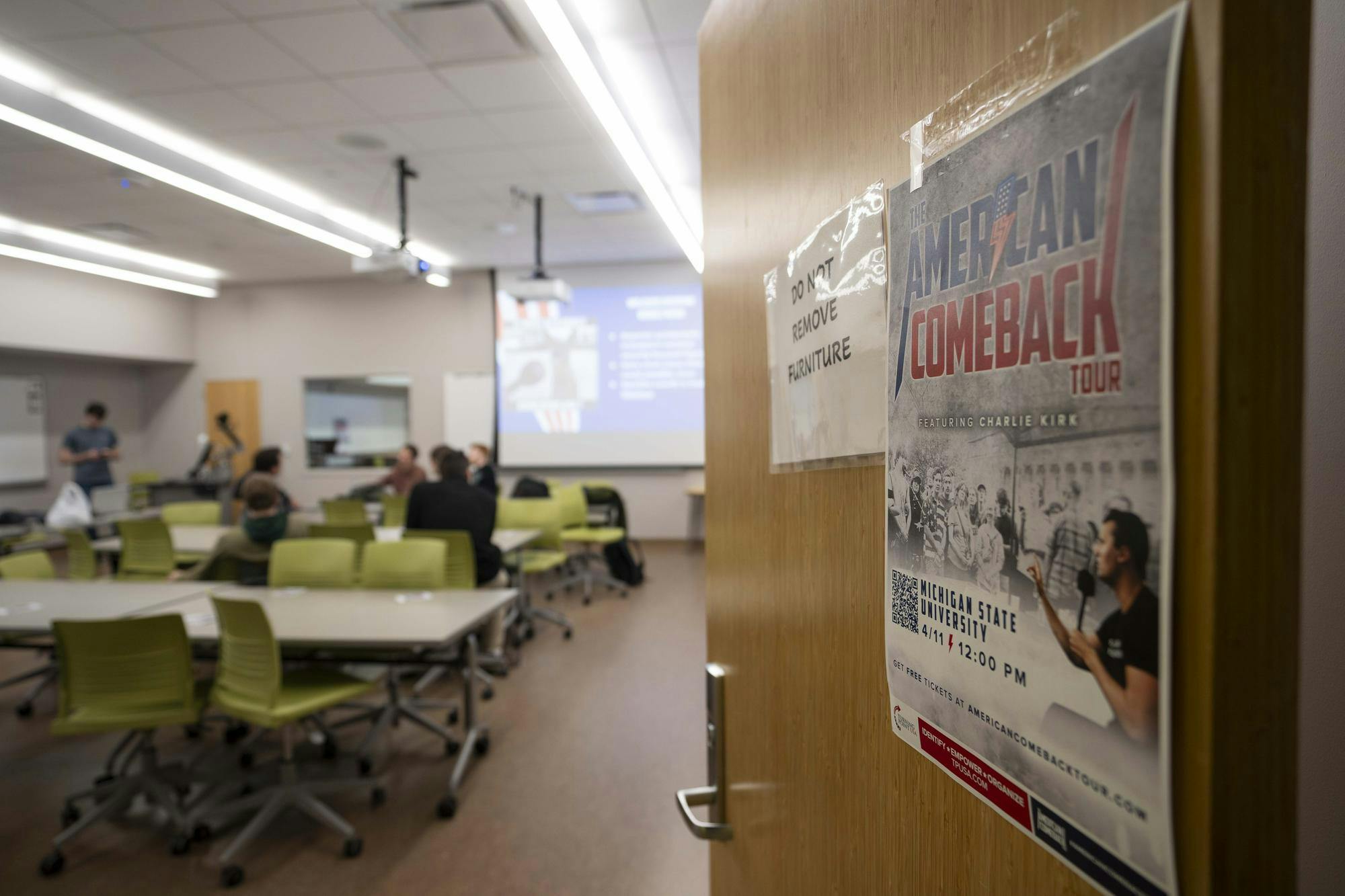
Their affinity for transgressive humor sometimes manifests itself as rebuttal to the perceived “wokeness” of the university. At a recent questionnaire with State Representative Steve Carra, Bitzan joked that it “would’ve been awesome” if the group had instead hosted the far-right lawmaker at the newly opened Multicultural Center. (“I thought about it,” replied the group’s vice president.)
But they also love “ruffling feathers to ruffle feathers,” said MSU College Democrats President Liam Richichi. Turning Point has been purposefully placing flyers for Kirk’s event over those advertising an event held by College Democrats, Richichi said, sometimes tearing down their posters in the process. The person responsible has since been “reprimanded,” according to Bitzan.
Turning Point holds something close to respect for actions that combine the creative with the inflammatory. The group is currently in a squabble with a disgruntled former member who has taken to posting flyers around campus advertising a fake Turning Point event. Though Bitzan — who declined to say who was behind the flyers or what exactly they advertised — derided the move as an “immature troll” that was trying to “get a reaction,” he and others at a recent meeting lauded the stunt as “top-tier trolling.”
The group’s reputation for crossing social boundaries for comedic effect is easier to embrace when you’re already on the outskirts of your community’s accepted political beliefs, Bitzan said.
“Our goal isn't to make people hate us,” Bitzan said. “That's counterproductive. But we recognize that a certain amount of that is inevitable.”
“You spend some time in that position and pretty quickly it either bothers you — in which case you go do something else with your life — or you're comfortable with the fact that some people are going to like you, and some people aren't, and that's OK.”
At least, that’s the idea. In practice, Turning Point struggles to handle the consequences of some of its more provocative actions.
'F--- it, we ball'
Each of MSU’s three conservative organizations has its own, unique position at MSU. MSU Turning Point USA is interested in new age conservatism like Trumpism and populism, while MSU Young Americans for Freedom is dedicated more to “classic conservative values” such as those pioneered by Ronald Reagan, said political science senior and former secretary of MSU Young Americans for Freedom Zayne Bratschi.
Both groups are chapters of nonprofit organizations, meaning they can’t explicitly endorse or campaign for electoral candidates. That job is left to the College Republicans, whose founding purpose is to help Republican candidates get elected. The group attracts members from both Turning Point and Young Americans for Freedom, College Republicans President Zach Friedman said. (The pro-life group Protect Life at MSU, while not explicitly conservative, draws many of its members from conservative groups.)
No matter their political differences, students enjoy lengthy, detailed discussions of current political happenings across the three conservative organizations.
They make no attempt to defend or rewrite the Trump administration’s more unprecedented headlines. Instead, their perspective on the recent federal upheavals, particularly the man at their center, is one of amusement and revelry, occasionally colored with a twinge of frustration that they, too, aren’t in the thick of it all.
At recent meetings, students mulled over Trump’s AI-generated vision for a post-war Gaza (“that was so funny”), White House Press Secretary Karoline Leavitt’s jab at a French lawmaker who suggested the U.S. give back the Statue of Liberty (“the memes that are coming out of this are fantastic”), and Elon Musk’s demand that federal workers email five things they did the week prior to the Office of Personnel Management (“my life goal is to be able to respond to that email with five black boxes ‘cause I can't say anything that isn't classified”).
Support student media! Please consider donating to The State News and help fund the future of journalism.
Many have their disagreements with certain policies and strategies of the Trump administration. But overall, they seem to embrace its bold chaos.
“They've been taking the mentality best described as, ‘F--- it, we ball,’” one member said at a Turning Point meeting last month.
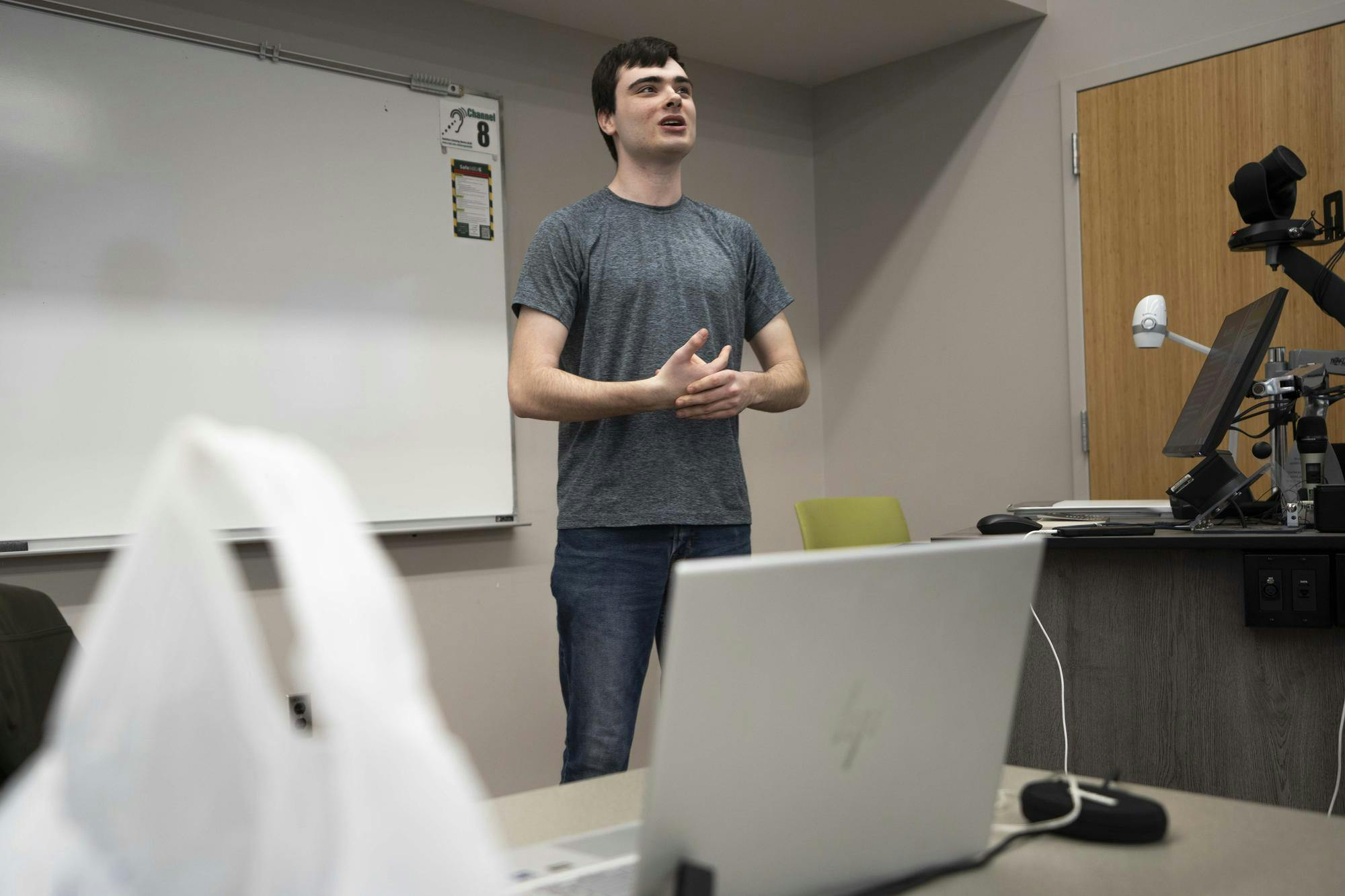
There’s an undeniable sense of community shared among members of MSU’s conservative groups. Like any group of friends, they’re there for each other, whether it's to give rides to mass or coach someone on talking to girls.
“It’s like one big family,” remarked one Young Americans for Freedom member at a recent meeting.
Relations between the organizations aren’t always perfect, however. At the start of this year, Turning Point reserved the same room and general time slot that Young Americans for Freedom has been using for its meetings since 2019, according to Bratschi, sparking what Friedman called a “feud” that continues to this day. Young Americans for Freedom now holds its meetings in a room next door, a half hour before Turning Point meetings start. The new scheduling arrangement has divided MSU’s conservatives, forcing them to choose which group to attend. (Bitzan said he was not president when the rooms were scheduled therefore couldn’t comment, but he acknowledged that “some people were frustrated about the timing.”)
Watchdogs
At last week’s Turning Point meeting, club members picked at flyers for Kirk’s event scattered across tables while chatting about it amongst themselves. They rushed through the opening formalities of their meetings — the pledge of allegiance, a discussion of current political happenings — so they could discuss preparations for the event.
But, before they could get to the official reveal, a member walked into the meeting with a paper that she had torn off a wall outside. She handed it to Bitzan with a worried look.
“Did you see this?” asked Cassidy Rosser, a food science senior and president of Protect Life at MSU.
The flyer advertised a book talk to be held on campus by a transgender poet.
“Um,” Bitzan replied. “What is this? A book club of some kind?”
“It’s a transgender reading, I think,” Rosser replied gravely.
“We’ll take a look,” Bitzan said.
The interaction was a rare inside look at one of Turning Point's principal functions: to act as the university’s watchdog.
That can range from taking “substantive” action against biased professors to “simply posting about something we see as silly,” Bitzan wrote in an email to The State News. In November, Turning Point sicced the press on a professor who, after election results came in, told her students she thought it "unbelievable" that "so many Americans are so utterly naïve and would fall for this and support misogyny, racism, xenophobia, hate and violence." In February, the organization posted a screenshot of the bio of an MSU arts and humanities professor who describes herself as an “artist-scholar, teacher, amateur circus performer, avid flower photographer, part-time cat rescuer, and full-time ghost hunter,” writing, “Your tax dollars fund this!”
The group’s faculty adviser, R. Mark Worden, also solicits examples of bias and “free speech suppression” to advocate for conservatives at the university governance level, Bitzan said. Worden did not respond to requests for comment.
In the case of the book talk by the transgender author, Bitzan said Turning Point “briefly looked at the event details and decided that it was irrelevant to our work, so we ignored it.”
Still, the efforts are appreciated by many conservatives at MSU who feel that being openly conservative on a predominantly liberal campus is — as Rosser put it in an interview with The State News — “terrifying.”
Rosser’s professor and a classmate once berated her for an hour and a half after a heated class discussion over abortion, she said. She was told that “bad things were happening in the world because of me personally” and that she should have kept her views to herself, Rosser said.
Bitzan, too, has come to expect “dirty looks” when he expresses a conservative opinion.
“It's a very liberal environment,” Bitzan said. “And there seems to be a perception that disagreements on politics immediately implicate moral character in a way that I don't think is accurate.”
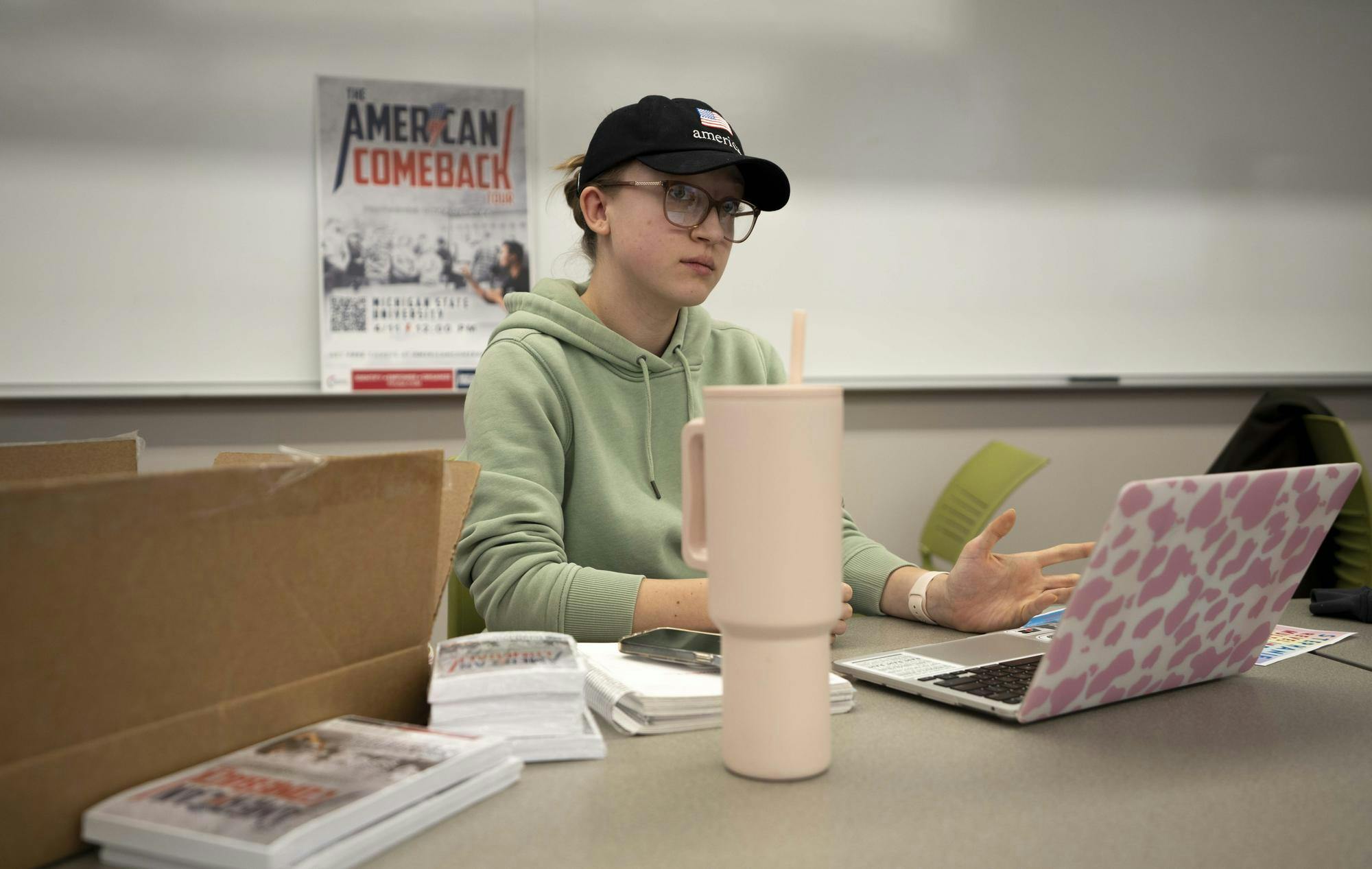
Responding to backlash
Turning Point is prepared for backlash when Kirk comes to town. By this point, it seems inevitable. Events held by conservative student organizations are constantly met with backlash, sometimes turning violent. Bitzan was one of a handful of students at an anti-transgender display held by Young Americans for Freedom at Brody Hall last spring when a student flipped over the table and struck two members. Several students protested the display a week later, calling on the university to recognize the booth as hate speech.
The point of Kirk's event, however, is to have opposing viewpoints represented, Bitzan said at the Turning Point meeting. He wants to personally invite everyone from “College Democrats to some of the LGBT groups on campus, to Sunrise, to the, you know, Palestine people” to ask Kirk their hardest questions — even MSU’s Young Communist League, a far-left group that often protests their events. (“Lord knows they’re going to be there,” one member quipped.)
Richichi told members of MSU College Democrats to be careful if they plan on attending the event. He worries that Kirk, whose “schtick is being abrasive,” could turn into a double-edged sword for those looking for real conversation.
“They're trying to bait us in and then they're going to be absolute dickheads when we get there,” he said.
After the Turning Point meeting ended, the group went out to post flyers around campus. They’ll have to do it every couple of days because they’ll get torn down, Bitzan told the group.
Kirk's event will serve as a rare occasion when someone else will field angry questions about politics, not Turning Point. The group often holds tabling events, where members talk to passersby about controversial subjects. It's something they prepare and practice for at their meetings.
At a meeting in February, Bitzan spun a wheel labeled with terms like "Transgenderism," "Abortion," "Race and DEI" and "Gun control." A selected attendee would have to debate Bitzan, who argued the liberal stance, on whatever it landed on.
It was clear that Bitzan, a star of his high school debate team, could have swiftly and soundly defeated nearly every one of his opponents, even while arguing for something he didn't believe in. But he stopped the conversations short before he did so.
Bitzan debated one attendee on "transgenderism." The attendee argued that since gender dysphoria is in the Diagnostic and Statistical Manual of Mental Disorders, treatment should address the "root of the problem." Instead of using hormones to transition, transgender individuals should try "cognitive behavioral therapy or talk therapy," they argued.
“I would love it if that was successful, but unfortunately the data just shows that it isn't," Bitzan replied. "The studies have been pretty clear that various forms of therapy do not result in changed outcomes for people struggling with gender disorder or people who identify as transgender.”
It would be a disservice to deny people from being who they feel they are inside, he concluded.
"Hm," his debate opponent responded. "How do you feel about transracialism?"
To a certain degree, ethnicity is malleable, Bitzan said. But he doesn't believe there are many that identify as a race they have no heritage in.
The attendee argued that switching races is similar to identifying with a gender that one wasn't born with.
"What if I want to identify as a Black woman?" they said. "Then I'm being discriminated against because of how I feel?"
"OK, thank you so much," Bitzan responded. With that, the debate was over. There was brief applause before the attendee sat down, and Bitzan spun the wheel once more.
Bitzan's advice throughout the exercise was to "stay calm, be the rational person in the room, not seem like a jerk." It's a sentiment shared across organizations. Conservative students are trained to use compassion and avoid aggression when talking about their beliefs.
“You never get emotional or angry back,” Bratschi said.
It’s an especially pertinent message at Protect Life at MSU, where members are taught to never demonize someone who has gotten an abortion. In the fall, the organization voted to stop displaying what pro-life organizations refer to as abortion victim photography — enlarged pictures of bloodied fetuses that are displayed in public in an attempt to show the brutality of the procedure — because they found that it doesn’t encourage conversation at MSU, Rosser said.
With how tense of a subject abortion already is and how much contempt some students hold for pro-life activists, Rosser said, “evoking more emotion doesn't seem to be productive."
But being provocative has its benefits too, Bitzan says. While the purpose of Turning Point's tabling is to “plant a seed” in someone’s mind, equally important, however, is “making headlines.”
'Dibs'
Turning Point made its biggest headline on Oct. 14, 2024.
Earlier that day, MSU’s North American Indigenous Student Organization painted the Rock with a chain of people holding hands and the message, “We are still here,” a celebration of Indigenous Peoples’ Day.
But Turning Point had its own plans for the holiday.
Before the day ended, members of the organization painted over the message in all black. Scrawled in white spray paint, they wrote:
"'Dibs.' -Columbus 1492"
The attempt at a joke — a reference to Christopher Columbus’ arrival to the Americas in 1492 — was quickly condemned by Indigenous students and painted over several times by other student groups. Near midnight, Turning Point came back to repaint the Rock with the U.S. flag, adding "p.s. dibs” underneath it.
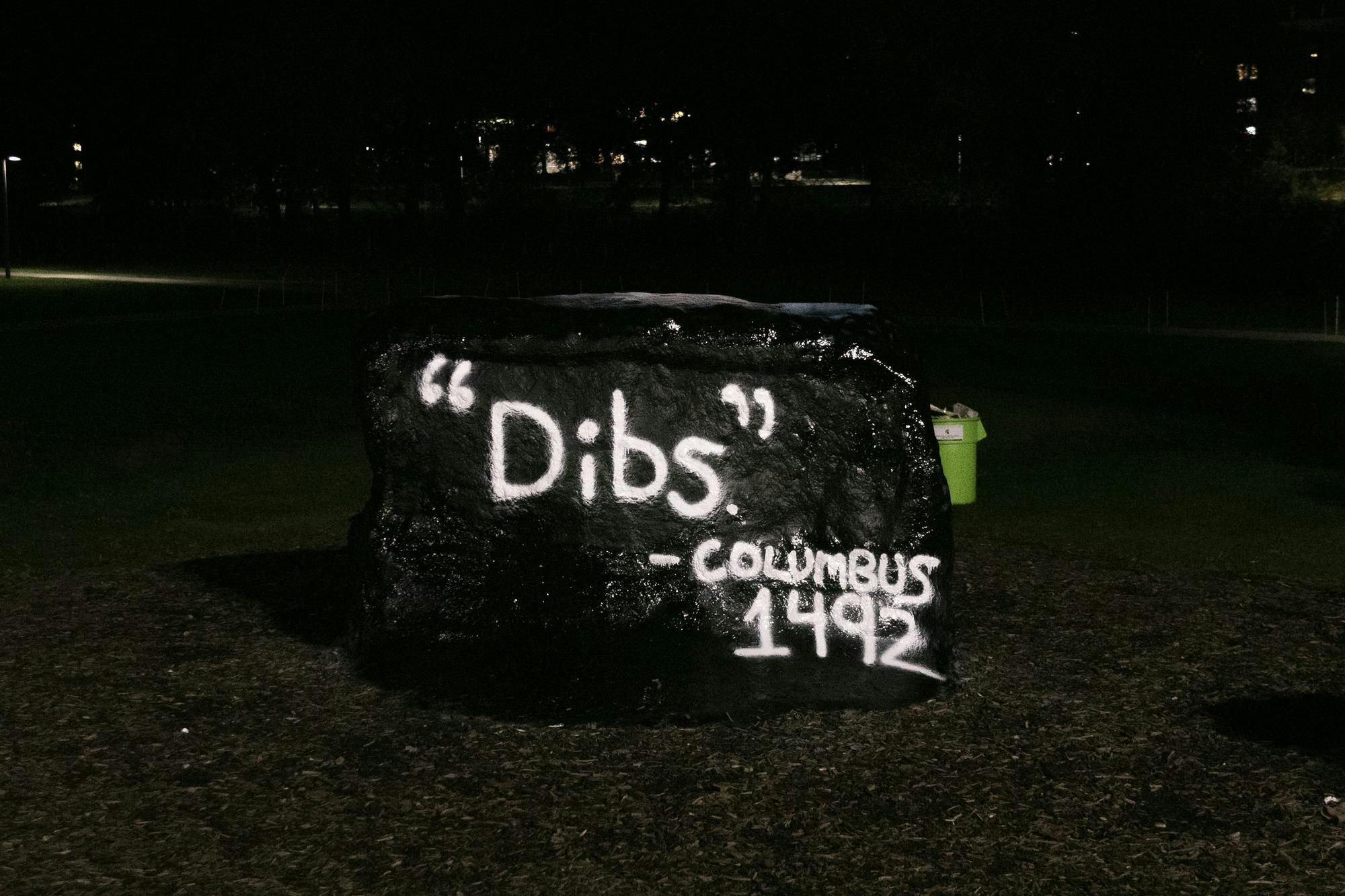
Turning Point USA painted over The Rock on Farm Lane on Oct. 14. 2024. Courtesy photo from Erick Diaz Veliz
Turning Point's original plan was to write something along the lines of “Happy Columbus Day,” Bitzan said, until a member suggested that it would be “kind of funny” to paint the more provocative message, which they had seen on a pin, instead.
The message was meant to be a critique of the movement to replace Columbus Day with Indigenous Peoples' Day. Bitzan said he has no objection to celebrations of Indigenous heritage, as long as they aren’t done by “co-opting a celebration of our shared American heritage.”
Within the group, the incident is often referred to as just “dibs.” A new attendee at a recent Turning Point meeting, unfamiliar with the phrase, asked, “Is that the Rock thing?” The question was met with laughter and several members saying "yeah."
“Dibs” has become inseparable from the group’s reputation in recent months. Photos of the debacle garnered millions of views on social media. Members spent 80% of Springticipation, an annual event that highlights student organizations, talking to people about it, Bitzan said. The phrase was also written on a white-erase “free speech board” the group had at the event, where it was later crossed out and replaced with “DICKS.”
Several individuals reported Turning Point to the university after the incident “in an attempt to get some of our actions shut down,” but none have worked, Bitzan said. A spokesperson for MSU said at the time that while the university was “disappointed that insensitive messages have been painted,” the Rock is "an important landmark and form of expression of the MSU community."
Though Bitzan said he wasn’t personally aware of any internal debate before painting the Rock, it hasn’t always been easy for MSU’s conservatives to mitigate controversy following the incident. Samuel Lucido, who was replaced by Bitzan as the organization’s president shortly after “dibs,” issued an apology for the incident on his private Instagram a week later, according to a screenshot of the post.
“I’ve decided that what I did was not right,” he wrote. “I do believe in the importance of preserving holidays such as Columbus Day, but what I did was not appropriate. I therefore would like to apologize to all those I’ve offended with my actions. Going forward I hope to foster much better relations with the indigenous students of Michigan State.”
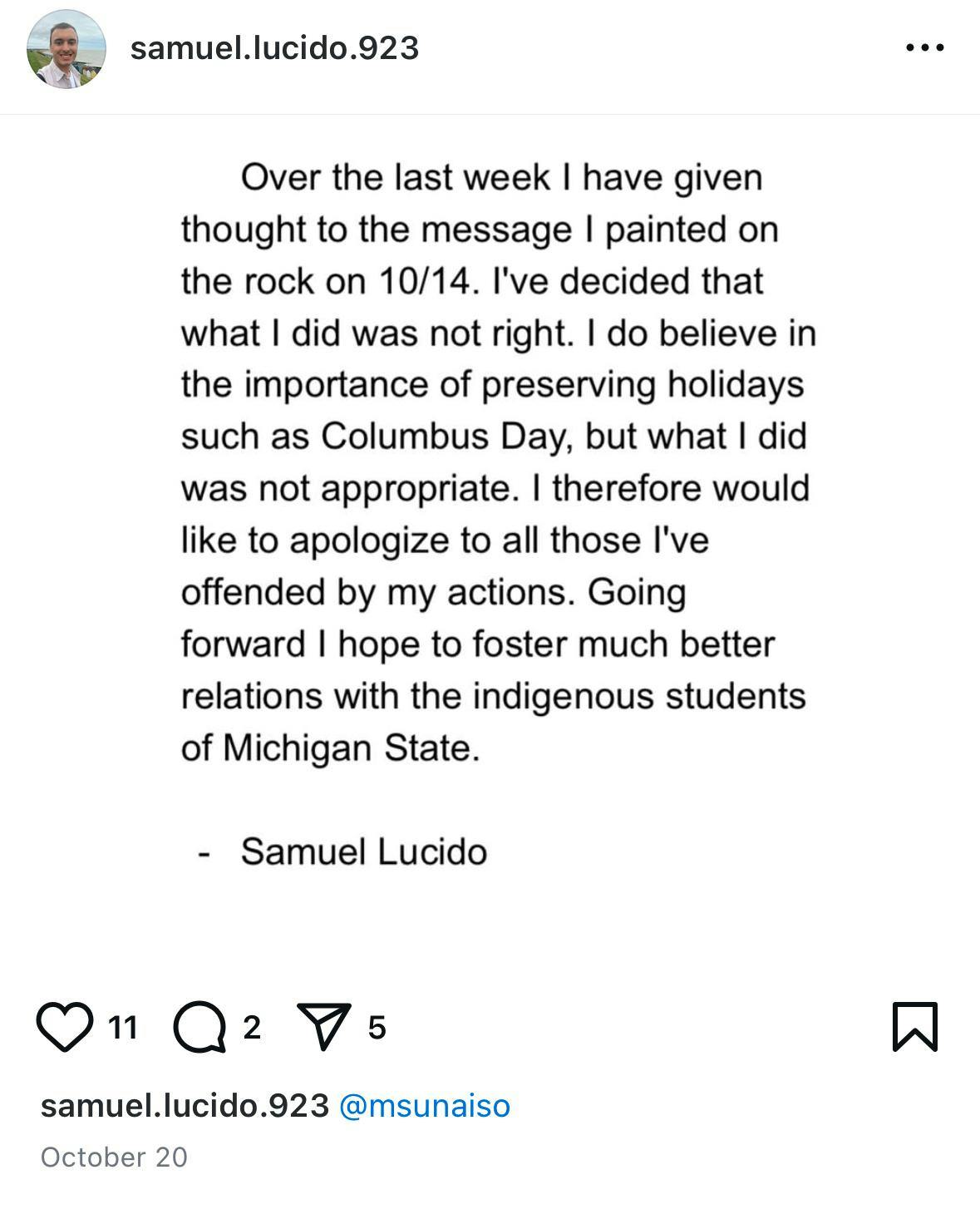
North American Indigenous Student Organization co-chair Zadok Milner said the group hasn’t received a direct apology from anyone in Turning Point, and doubted the post was “heartfelt” considering the “several lighthearted/proud references” Turning Point has made to the incident since. Lucido declined to comment, saying he was trying to “lay low for the remainder of (his) time at Michigan State.”
The opinions of other Turning Point members vary. Some, like Bitzan, embrace the controversy. At a recent club event, he even sported a “dibs” pin on his blazer. Others, like Lucido, are wary of discussing it at all. When asked about the incident, political science freshman and Turning Point member Dillon Chrestensen said, “I’m not going to comment on that. Next question.”
There are differing perspectives across organizations, too. Bratschi said the purpose of the Rock is to provide a canvas for student expression, even when “some people react well to that stuff and some people don't.”
But too much controversy can damage an organization’s reputation to the point where “your group becomes unattractive and being associated with it becomes a bad thing,” Friedman said, adding that he’s careful not to let that happen to MSU College Republicans. At a meeting last month where members discussed painting the Rock, Friedman warned the group against getting “Turning Point-ed.”
But controversy, when used strategically, can help a conservative organization grow, Bitzan argues.
“To a certain degree you play a numbers game where it's like, if I can get a big headline and 20,000 people are going to see it, even if I'm in a liberal environment such that 80% of the people oppose it, that still means I got … 4,000 people who went, ‘Oh, that's kind of neat,’” Bitzan said. “And in a world where controversy is somewhat inevitable — there is no way to say conservative stuff in this environment and not attract controversy — that's a win.”
“Is it possible that we alienated more people in the middle than we drew in? Maybe. There's a cost-benefit analysis to everything you do. But I can say with confidence that we've had multiple people hear about us from that and say, ‘I'm going to show up to a meeting.’”
Bitzan’s logic reflects the outreach strategy of many conservative student organizations. No one is trying to — or expects they even could — change the minds of those on the opposite end of the political spectrum. The real goal, several conservative student leaders agreed, is to at least plant a seed in the minds of those in the ideological middle.
But is it working?
Bitzan insists so. More people know about the group now, even through infamy. Dibs, he said, was a “success.”
Bitzan recalled that toward the end of Springticipation, after countless angry conversations about the rock seemed to have come to a close, an individual came up to Turning Point’s booth. He had passed by it earlier that day without looking in its direction.
“I love the work you guys do,” he said, according to Bitzan. “I'm just scared to be associated with it."



